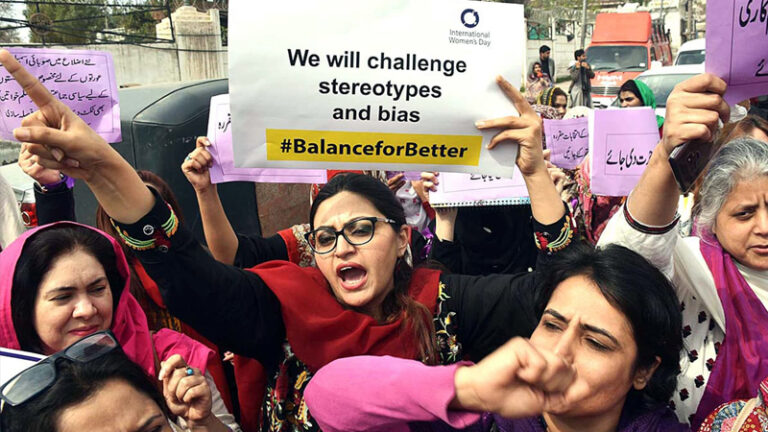
Aurat March Lahore has announced its manifesto for 2022 centering on the theme of “Reimagining Justice”, calling for a structural revision of the state and society’s conception of justice.
The organisation released the manifesto on Friday through its digital channels and the event marks the fifth year of the march in Pakistan. This year’s theme is “Reimagining Justice” or “Asal Insaaf”.
The manifesto has been drafted after extensive research and meetings with relevant communities, including families having enforced disappearances, domestic workers, victims/survivors of sexual violence and religious minorities.
The manifesto explores the experience of women and gender minorities within court, pointing out how the current system is inadequate for survivors of violence. Cases such as the acquittal of Qandeel Baloch’s murderer show how deeply flawed the criminal justice system is.
It thus demands more holistic reforms which seek to transform society, provide psycho-social support to survivors of violence as well as rehabilitation for perpetrators.
The march advocates structural reforms that prevent patriarchal violence rather than short-term solutions such as capital punishment and chemical castration. It demands a radical shift in preventative policies: education, community building, and social welfare should drive the solutions.
They stress the need to create a “culture of care” where communities support rather than victim-blame each other.
Pointing out that Pakistan has the highest death row population in the world, the manifesto cites an excessive focus on carceral punishment to combat crime, and says the judicial system is discriminatory towards gender and ethnic minorities. Furthermore, the manifesto highlights the economic and environmental disparities which impact vulnerable groups.
Aurat March Lahore proposed a charter of 17 demands, ranging from more funding to ‘survivor-centric’ welfare organisations, and universal basic income and care work income for all, to the decriminalisation of defamation laws, and an end to ‘Safe City’ projects.
Since its inception, Aurat March has aspired to bring to light the myriad of injustices and inequalities faced by Pakistani women. It has come under criticism from religious groups in the country, who claim the movement offends Islamic principles; two years ago, the march in Islamabad turned violent after a group of men pelted female protestors with stones.
Earlier this week, Minister for Religious Affairs and Interfaith Harmony Noorul Haq Qadri wrote a letter to Prime Minister Imran Khan asking him to stop this year’s march as he claimed it ‘ridicules, diminishes or minimizes Islamic laws, social mores, decency, or purdah or hijab.’
This year’s Aurat March is scheduled to be held on March 8 in cities and towns across Pakistan.